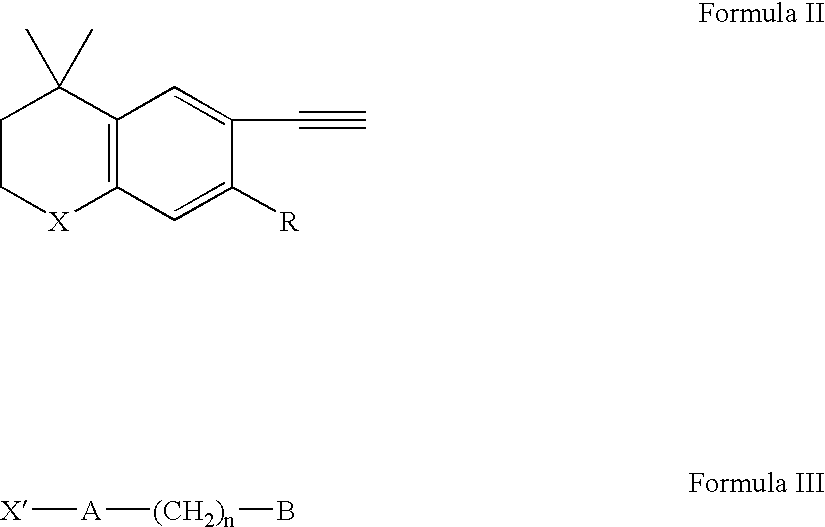Methods of treating nodulocystic acne
- Summary
- Abstract
- Description
- Claims
- Application Information
AI Technical Summary
Benefits of technology
Problems solved by technology
Method used
Image
Examples
example 1
Coadministration of 6.3 mg oral tazarotene with a high-fat meal in normal healthy subjects following single and multiple dose administrations does not substantially affect the bioavailability or pharmacokinetics of tazarotenic acid, the primary active retinoid species in the systemic circulation. This result is based on comparing the pharmacokinetics of tazarotenic acid when administered within 30 minutes after consuming a high fat breakfast vs. when administered after an 8-10 hour fast. The 90% confidence intervals (CI) of AUC ratios (test / reference) are completely within the 80-125% boundary. The 90% CI ratio of Cmax values are partially outside the 80-125% boundary due to data variability, but the average ratios of 1.00 (Day 0) and 0.829 (Day 9) are within the above-noted limit.
Each of isotretinoin, acitretin and bexarotene is commercially available as an oral active retinoid agent. To one degree or another, patients taking each of these agents are instructed to take the agent...
example 2
A series of Phase 3 studies are conducted on orally administered tazarotene for the treatment of psoriasis. Adverse events (side effects) are monitored. Results of such monitoring are shown in Table 1. In addition, published data for acitretin's side effects are also considered. Table 1 shows the adverse events reported for at least 10% of the patients in the studies of acitretin versus those seen with tazarotene.
TABLE 1NUMBER OF (%) OF PATIENTSTaz 4.5 mgTaz 4.5 mgStudy 3Study 3Taz 4.5 mgtreatedtreatedCombinedwithwithdata fromTazaroteneTazaroteneStudies 1for 6for 3and 2monthsmonthsAcitretinAdverse Event(N = 348)(N = 92)(N = 220)(N = 525)Cheilitis228 (65.5)65 (70.7)149 (67.7)429 (81.7)Skin 3 (0.9) 1 (1.1) 3 (1.4)345 (65.7)peeling / DesquamationAlopecia 1 (0.3) 5 (5.4) 1 (0.5)319 (60.8)Dry Skin 82 (23.6)24 (26.1) 47 (21.4)174 (33.1)Nail Disorder 2 (0.6) 1 (1.1) 1 (0.5)170 (32.4)Pruritus 21 (6.0) 3 (3.3) 11 (5.0)157 (29.9)Rhinitis 8 (2.3) 0 (0.0) 0 (0.0)153 (29.1)Sticky skin / Skin 1 (0...
example 3
Two multicenter, double-blind, randomized, placebo-controlled 24-week studies of identical design are conducted to evaluate the safety of oral tazarotene. In addition, 16- to 24-week dose-response evaluations are performed.
In the two safety trials, the incidence of adverse side effects with a 4.5 mg dose administered orally once daily is compared to the incidence of the same side effects with a placebo. The following side effects are found to occur significantly more frequently with tazarotene than with the placebo: cheilitis (66% vs 17%), dry skin (24% vs 15%), headache (19% vs 12%), arthralgia (17% VS 8%), myalgia (14% vs 8%), back pain (7% vs 3%), joint disorder (4% vs 1%), nasal dryness (4% vs 1%), foot pain (3% vs 1%), rash (3% vs 1%), hyperglycemia (2% vs 0%), and dermatitis (1% vs 0%). The majority of these were mild in severity and typical of adverse effects associated with oral retinoids. Particularly noteworthy is that other adverse effects typically associated with ora...
PUM
| Property | Measurement | Unit |
|---|---|---|
| Fraction | aaaaa | aaaaa |
| Fraction | aaaaa | aaaaa |
| Time | aaaaa | aaaaa |
Abstract
Description
Claims
Application Information
 Login to View More
Login to View More - R&D
- Intellectual Property
- Life Sciences
- Materials
- Tech Scout
- Unparalleled Data Quality
- Higher Quality Content
- 60% Fewer Hallucinations
Browse by: Latest US Patents, China's latest patents, Technical Efficacy Thesaurus, Application Domain, Technology Topic, Popular Technical Reports.
© 2025 PatSnap. All rights reserved.Legal|Privacy policy|Modern Slavery Act Transparency Statement|Sitemap|About US| Contact US: help@patsnap.com



